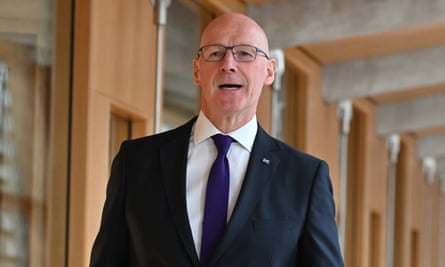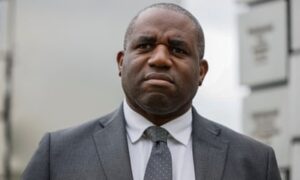The deputy leader of Scottish Labour said she was taking “nothing for granted” after a poll suggested the party is poised for huge gains north of the border at the general election.
Jackie Baillie said: “We are moving in the right direction but I always approach elections with respect … We have our candidates out there, knocking on as many doors as they can. We started last year with maybe six target seats and now we have considerably more than that.”
Analysis of a poll last week suggested the SNP could be left with fewer than a dozen MPs – down from the 43 it currently holds – while Labour could see a jump from two to 35 in Scotland.
Baillie, who has been the party’s deputy leader in Scotland since 2020, said: “I think the problem for [SNP leader] John Swinney is that people know that every seat that goes to Labour increases the chance of a Labour government at a UK level. They want the Tories out, and a lot of people want to put the SNP on notice.”
On Friday, Keir Starmer pledged to make Scotland “central to the mission” of a Labour government during a visit to Glasgow, one of the first stops on his election campaign.
Accompanied by Anas Sarwar, the party’s Scottish leader, Starmer said: “There is no Labour without Scotland” and pledged to stabilise the economy, protect workers and create “tens of thousands of jobs” by basing a new publicly owned power company, Great British Energy, north of the border.
The decision by Rishi Sunak to hold a general election on 4 July had drawn condemnation from Swinney, Scotland’s first minister, who complained that it falls during the country’s busiest holiday week.

In reality, the SNP leader faces far bigger problems than the timing. Swinney, a political veteran and former leader of his party, took the helm again earlier this month after Humza Yousaf resigned following the collapse of the SNP’s power-sharing deal with the Greens.
The long-running Police Scotland investigation into the SNP’s finances overshadowed Swinney’s bid to kick off the party’s election campaign when it emerged a report had been sent to prosecutors in relation to an embezzlement charge faced by Peter Murrell, the former party chief executive and husband of former first minister Nicola Sturgeon.
The Crown Office and Procurator Fiscal Service confirmed that investigations involving Sturgeon – who has repeatedly denied any wrongdoing – and ex-treasurer Colin Beattie are ongoing, but neither has been charged.
Swinney also faces strong criticism for his defence of Michael Matheson, the former health secretary who resigned after it emerged he charged the taxpayer for £11,000 of iPad roaming charges while on holiday.
The Scottish parliament’s standards, procedures and public appointments committee said Matheson should be banned for 27 sitting days, but Swinney has rejected the investigation as “prejudiced” and insisted that he would not back the punishment.
The scandals appear to have severely dampened public support for a party that has led Holyrood for 17 years.
after newsletter promotion
A YouGov poll published last week suggested that 29% of Scots intend to vote for the SNP, putting it 10 points behind a resurgent Scottish Labour, with the Conservatives at 12%, the Lib Dems at 8% and the Greens at 7%.
According to Sir John Curtice, election expert and professor of politics at the University of Strathclyde, such a result would mean the SNP plunging from the 48 Westminster seats it won in 2019 to just 11.
Labour would soar from two to 35 while the Conservatives would remain unchanged on six, with the Lib Dems up by one to four.
James Mitchell, professor of public policy at Edinburgh University’s School of Social and Political Science, said the general election comes at a time when the SNP is in “damage limitation” mode.
“The SNP cannot even fall back on a competent record in government. They are not improving outcomes for people. All the great rhetoric, such as closing the attainment gap in education, just has not happened.”
Mitchell suggested the party could also struggle to attract significant donations due to Police Scotland’s investigation.
Source: theguardian.com


















